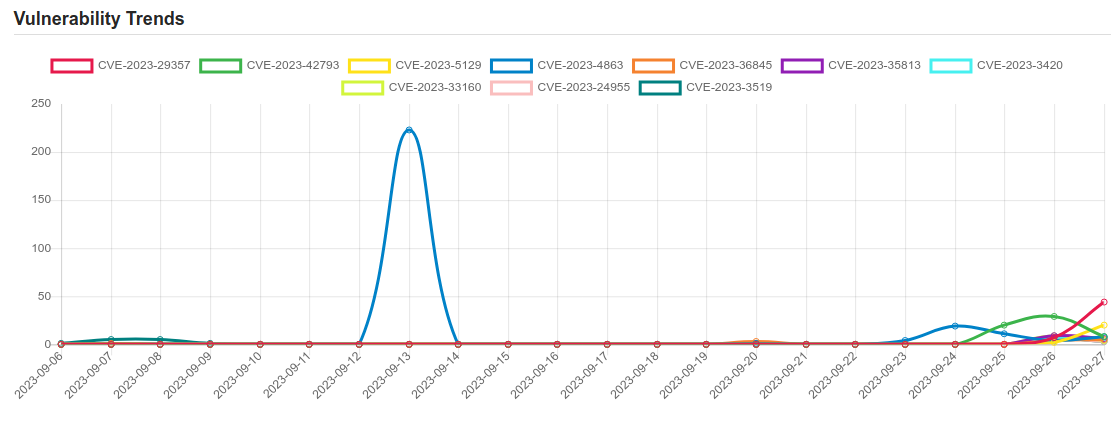Daily Vulnerability Trends: Thu Sep 28 2023

| CVE NAME | CVE Description |
| CVE-2023-29357 | Microsoft SharePoint Server Elevation of Privilege Vulnerability |
| CVE-2023-42793 | In JetBrains TeamCity before 2023.05.4 authentication bypass leading to RCE on TeamCity Server was possible |
| CVE-2023-5129 | ** REJECT ** This CVE ID has been rejected or withdrawn by its CVE Numbering Authority. Duplicate of CVE-2023-4863. |
| CVE-2023-35813 | Multiple Sitecore products allow remote code execution. This affects Experience Manager, Experience Platform, and Experience Commerce through 10.3. |
| CVE-2023-24955 | Microsoft SharePoint Server Remote Code Execution Vulnerability |
| CVE-2023-3519 | Unauthenticated remote code execution |
| CVE-2023-30845 | ESPv2 is a service proxy that provides API management capabilities using Google Service Infrastructure. ESPv2 2.20.0 through 2.42.0 contains an authentication bypass vulnerability. API clients can craft a malicious `X-HTTP-Method-Override` header value to bypass JWT authentication in specific cases. ESPv2 allows malicious requests to bypass authentication if both the conditions are true: The requested HTTP method is **not** in the API service definition (OpenAPI spec or gRPC `google.api.http` proto annotations, and the specified `X-HTTP-Method-Override` is a valid HTTP method in the API service definition. ESPv2 will forward the request to your backend without checking the JWT. Attackers can craft requests with a malicious `X-HTTP-Method-Override` value that allows them to bypass specifying JWTs. Restricting API access with API keys works as intended and is not affected by this vulnerability. Upgrade deployments to release v2.43.0 or higher to receive a patch. This release ensures that JWT authentication occurs, even when the caller specifies `x-http-method-override`. `x-http-method-override` is still supported by v2.43.0+. API clients can continue sending this header to ESPv2. |
| CVE-2023-29360 | Microsoft Streaming Service Elevation of Privilege Vulnerability |
| CVE-2018-17463 | Incorrect side effect annotation in V8 in Google Chrome prior to 70.0.3538.64 allowed a remote attacker to execute arbitrary code inside a sandbox via a crafted HTML page. |
| CVE-2023-41991 | A certificate validation issue was addressed. This issue is fixed in macOS Ventura 13.6, iOS 16.7 and iPadOS 16.7. A malicious app may be able to bypass signature validation. Apple is aware of a report that this issue may have been actively exploited against versions of iOS before iOS 16.7. |
| CVE-2023-41992 | The issue was addressed with improved checks. This issue is fixed in macOS Monterey 12.7, macOS Ventura 13.6, iOS 16.7 and iPadOS 16.7. A local attacker may be able to elevate their privileges. Apple is aware of a report that this issue may have been actively exploited against versions of iOS before iOS 16.7. |
| CVE-2022-2602 | No description provided |
| CVE-2023-26045 | NodeBB is Node.js based forum software. Starting in version 2.5.0 and prior to version 2.8.7, due to the use of the object destructuring assignment syntax in the user export code path, combined with a path traversal vulnerability, a specially crafted payload could invoke the user export logic to arbitrarily execute javascript files on the local disk. This issue is patched in version 2.8.7. As a workaround, site maintainers can cherry pick the fix into their codebase to patch the exploit. |
| CVE-2023-1234567 | No description provided |
| CVE-2023-4863 | Heap buffer overflow in libwebp in Google Chrome prior to 116.0.5845.187 and libwebp 1.3.2 allowed a remote attacker to perform an out of bounds memory write via a crafted HTML page. (Chromium security severity: Critical) |
A considerable amount of time and effort goes into maintaining this website, creating backend automation and creating new features and content for you to make actionable intelligence decisions. Everyone that supports the site helps enable new functionality.
If you like the site, please support us on “Patreon” or “Buy Me A Coffee” using the buttons below
To keep up to date follow us on the below channels.

![[NITROGEN] - Ransomware Victim: Progressive Auto Group 2 image](https://www.redpacketsecurity.com/wp-content/uploads/2024/09/image-300x300.png)

